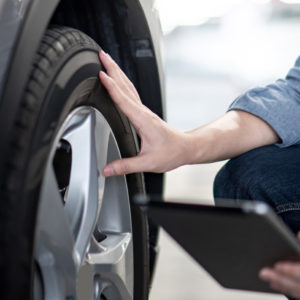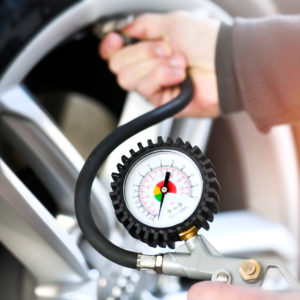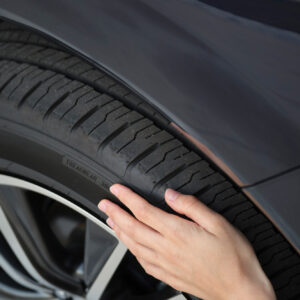As gasoline prices continue to rise, it’s no surprise that people are constantly looking for ways to improve their fuel economy. Drivers will often skip the air conditioning (A/C) and roll their windows down in an effort to burn less fuel, but is sweating it out really worth it? Does running the A/C really use more gas than driving with the windows down?
Driving With the A/C on vs. Driving With the Windows Down
As much as we’d like to settle the debate once and for all, the answer to this question isn’t so simple and can vary depending on several factors.
Air Compressor Efficiency
Between driving with the A/C on or with the windows down, the fuel-efficient choice will largely depend on the air compressor’s efficiency and whether you choose norm or max/recirc. The air compressor compresses the refrigerant into a high pressure gas, then it is carried through the compressor discharge line to the condenser so that the high pressure gas condenses to liquid form (giving off heat) before being piped through the orifice tube or expansion valve back into the evaporator where it absorbs heat. For the entire process, the engine has to use extra fuel to power the alternator, which in turn powers the entire A/C system, including the air compressor.
Air Resistance
Air resistance refers to the drag met by cars when moving against the air. The lower the drag, the less fuel you burn at a certain speed. This is why modern vehicles are designed to be aerodynamic, ensuring a smoother airflow.
When you roll down your windows and drive at a high speed, air flows into the car through the windows, increasing drag and causing your vehicle to burn more fuel. In contrast, when you close your windows, there’s less air resistance because air isn’t entering through the windows.
Type of Vehicle
Your car is probably the biggest factor that will determine if it’s better to drive with the A/C on or with the windows down. Vehicle shape, engine size, and compressor efficiency all play a role in how much gas your A/C system uses, and all of these characteristics will depend on your vehicle’s year, make, and model.
For example, scroll-type compressors don’t require as much horsepower as piston type compressors because they have fewer moving parts than piston compressors, and they’re quieter, too, but they don’t tend to last as long without needing replacement.
Does Your Car’s A/C Burn Gas?
No, it doesn’t burn gas directly, but it does increase engine load, which causes the engine to use a bit more fuel. Also, the alternator is powered by the engine, and when the A/C is engaged and the blower motor is running at a higher speed, the alternator will use a bit of engine power as well.
No, your car’s A/C doesn’t burn gas directly, but it does increase engine load, which causes the engine to use a bit more fuel.
– Richard McCuistian, ASE Certified Master Automobile Technician
How Much Gas Does a Car’s A/C Use?
In some cases, the effect on gas mileage can be as little as 3%, but it can also go higher than 10%. Running your A/C system is sure to increase fuel consumption, but its exact effects can vary depending on several factors.
Outside Temperature and “NORM” Setting
When it’s hot out, your vehicle’s A/C has to work harder to cool your cabin if you have the A/C set on norm rather than max/recirc. This means that unless you have the A/C on max, it has to use more fuel just to regulate your car’s temperature because on norm, it pulls air from outside the car. If you have it set on max, it’s recycling the air and gets a lot cooler, and since compressor operation is tied to the pressure and temperature of the refrigerant, the compressor won’t run as much on max as it will on norm. Try this on a trip and check your fuel economy both ways. You’ll be surprised how much of a difference max will make.. During extremely hot days, your A/C can reduce fuel economy by more than 25% if you’re operating the A/C on norm.
Driving Habits
How you drive can also affect how much gas your car’s A/C system uses. If you often drive in stop-and-go traffic or go on short trips with the A/C running, it’ll most likely burn more fuel, but being cool while you drive is why you have A/C in the first place, so there’s that.
When Does Air Conditioning Use Less Gas?
In 2004, the Society of Automotive Engineers (SAE) conducted a study to settle the debate once and for all. In a wind tunnel, they tested two vehicles: a full-size sports utility vehicle (SUV) with an 8.1-liter V8 engine and a full-size sedan with a 4.6-liter V8 engine.
With the windows down, the sedan’s fuel efficiency was reduced by 20%, while the SUV’s fuel efficiency dropped by 8%. In both cases, driving with the windows down led to a significant drop in fuel efficiency compared to running the vehicle’s A/C. They concluded that the more aerodynamic the vehicle, the more drag open windows create, and the more drag open windows create, the higher the fuel consumption.
When Does Rolling the Windows Down Save Gas?
In 2013, the SAE conducted another test, this time with a 2009 Toyota Corolla and a 2009 Ford Explorer, both driven at various speeds. They discovered that the Corolla had to travel over 80 mph before driving with the windows down was less fuel efficient than driving with the A/C on. Meanwhile, driving with the windows down in the Explorer was more efficient at lower speeds, but there wasn’t much difference even when it traveled 60 mph.
If you’re just driving around town at relatively low speeds, you can turn the A/C off and just roll your windows down (unless it’s really hot, and then you’ll want to use the A/C). You’re likely to spend less fuel this way because there’s less aerodynamic drag.
A good rule of thumb to follow is to open the windows when you’re driving under 40 mph in a larger vehicle or up to 70 to 80 mph in a smaller car.
How To Improve Fuel Economy
There are plenty of other ways you can improve your vehicle’s fuel economy.
Remove Excess Weight and External Accessories
Excess cargo weight can cause your vehicle to use more fuel than it has to. As much as possible, only bring the necessities and get rid of any heavy items. Roof racks, brush guards, and anything else that catches the wind will cause additional wind drag.
Maintain the Correct Tire Pressure
Underinflated tires have higher rolling resistance, which can significantly reduce fuel economy. To avoid this, make sure your tires are always properly inflated.
Follow Proper Vehicle Maintenance
The secret to good fuel economy is to follow your manufacturer’s recommended service schedule. Regularly maintain driveline components, and check on your A/C system’s condition.
Avoid Excessive Idling
When idling, cars can burn anywhere from a quarter to half a gallon of fuel per hour. As much as possible, find a safe place to park and shut off your engine instead of idling.
Park Under the Shade
Avoid parking under the sun, where your car is likely to heat up. Park under the shade or use a sun shade to keep your cabin while you’re away.
Observe Good Driving Habits
Rapid acceleration and hard braking tend to consume more fuel than necessary. Avoiding the two can help lower fuel economy anywhere from 10% to 40%.
Make Your A/C Run Like New With High-Quality Parts
As your vehicle racks up mileage, some A/C components can develop issues and become less efficient. Your A/C system might be getting power from the engine, but it might not be properly turning that energy into cabin cooling. Don’t hesitate to get replacement A/C components like compressors and evaporators so your A/C can perform optimally again.
CarParts.com is a trusted source when it comes to vehicle parts and accessories. We source our parts from reputable aftermarket manufacturers. Rest assured that our parts will function just like the original, as they’ve been made with the specifications of your vehicle in mind and have passed stringent testing and quality control standards.
When shopping for A/C components, you’ll need to choose the model compatible with your vehicle model. Luckily, that’s as easy as pie since we have a vehicle selector that allows you to filter results to parts compatible with your vehicle model.
So what are you waiting for? Shop for high-quality A/C compressors and A/C evaporators here at CarParts.com today!
Any information provided on this Website is for informational purposes only and is not intended to replace consultation with a professional mechanic. The accuracy and timeliness of the information may change from the time of publication.





















